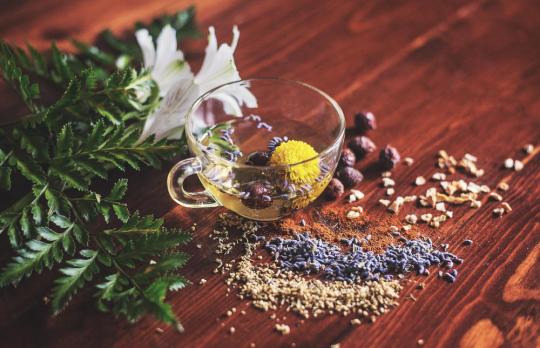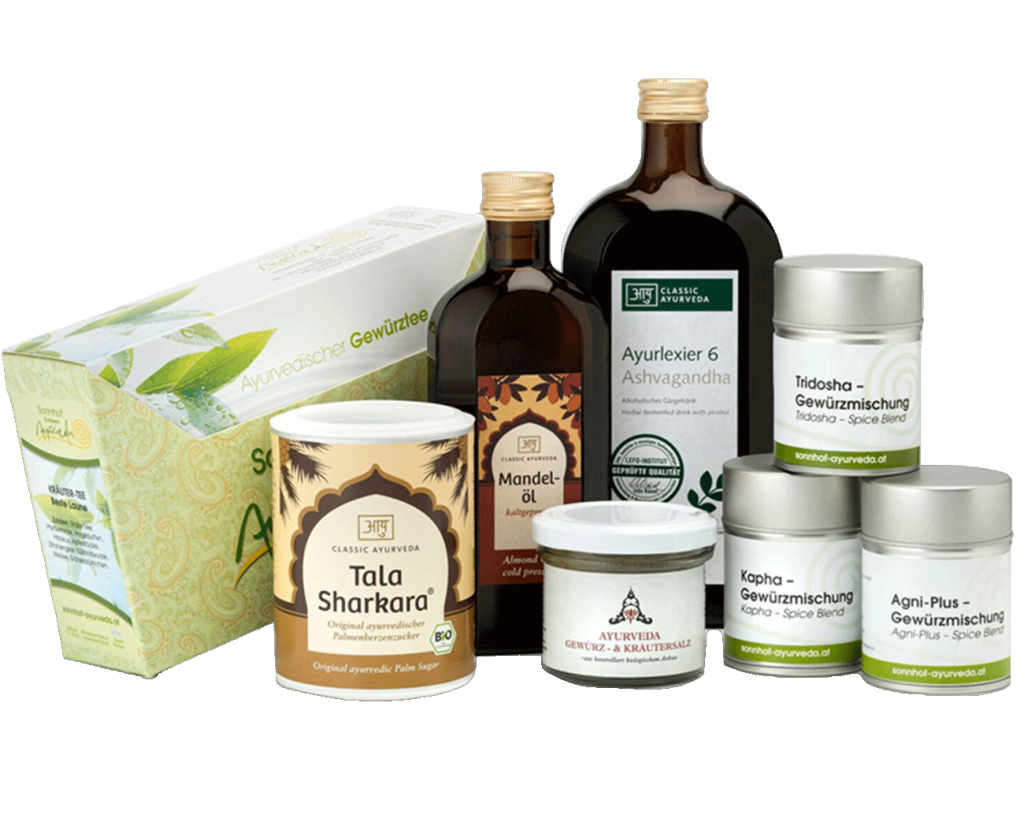When the temperatures drop, it's that time of year again: the cold season sets in. Ayurveda offers a number of beneficial options to help you arm yourself against colds. As a holistic healing art, Ayurveda is primarily concerned with strengthening the body's defences through a balanced lifestyle. However, if you do catch a cold, Ayurvedic teachings have some advice on how to get rid of the annoying cold and cough as quickly as possible. With a few gentle home remedies, you will regain your well-being in no time.
How does a cold develop? Ayurvedic view
According to Ayurveda, colds are related to an imbalance in our doshas. In the cold season, our doshas are particularly challenged: The constant change between warm and cold temperatures unbalances the interplay of Vata, Pitta and Kapha.
In addition, the cold causes the doshas Vata and Kapha to increase and the digestive fire (Agni) to weaken. This makes us more susceptible to colds. Basically, Kapha and Vata types catch colds more quickly, whereas the natural warmth of the Pitta types has a preventive effect.
Blockage of the airways (Prana-Vaha-Srotas)
Coughs and colds lead to a blockage of important body channels (srotas). The channels of respiration and life energy are the so-called "Prana-Vaha-Srotas". When metabolic waste products (ama) accumulate in the prana-vaha-srotas, the body's balance is disturbed and we develop the familiar symptoms. A detoxifying diet and cleansing steam baths help to release the blockages of the srotas.
Cold symptoms with excess of kapha & pitta doshas
Depending on which dosha is dominant, we develop different symptoms.

Colds are mainly caused by excessive Vata or Kapha dosha. Which therapy is best for you therefore also depends on the type of cold you have.
An excess of Vata leads to:
- dry mucous membranes
- Hoarseness
- thin secretions
- Dry, intense cough
An excess of Kapha manifests itself in:
- moist, productive cough
- Tiredness and heaviness
- viscous, persistent secretion
Recommendations for balancing the doshas
So first consider what symptoms you have: Are they more due to too much Vata or too much Kapha? To calm the doshas, the following foods are recommended:
Against Vata symptoms: Warm, soothing food with sweet, salty and only slightly spicy taste. For example, creamy carrot or pumpkin soup with spices such as long pepper, rock salt, cumin, and sage.
Against Kapha symptoms: Warm, stimulating dishes with bitter, tart and spicy flavours. For example, mungdal with kale and fiery spices such as chilli or garlic.
Healthy through nutrition: Eating with a cold
With the right diet, you activate your self-healing powers and help the immune system get going. If you have a cold coming on, you should eat mainly warm, light foods. Hard-to-digest foods put additional strain on the digestive system (Agni). So leave out fatty and animal foods (cheese, butter, meat, eggs, fish) and sweets. You should also avoid raw and cold foods. On the other hand, warm, cooked foods such as vegetable soups without fat, stews and lots of spiced tea are particularly good for you.
You should also avoid acidic foods when you have a cold: From the Ayurvedic point of view, acidic foods promote inflammation in the body. Ayurvedic teachings therefore advise against common household remedies such as hot lemon or orange juice.
Drink, drink, drink: enough warm drinks
Support the healing process with sufficient fluids: This flushes pathogens out of the body and compensates for fluid loss. It is recommended to take a drink of hot water or tea once an hour. Especially warm drinks with medicinal herbs and spices, such as ginger tea or Ayurvedic herbal teas , are very beneficial. Sweeten the tea with honey if you like; this has an antibacterial and expectorant effect.
With herbs and spices against a runny nose
Ayurvedic medicine knows numerous spices that are effective against colds and support our body in natural regeneration. Spicy and tart substances boost the metabolism and revive the inner fire (Agni).

Therefore, enrich soups and teas with these beneficial spices:
- Cinnamon
- Cardamom
- Turmeric
- Ginger
- Long pepper
- Cloves
- Asafoetida
- Galangal
- Ajowan
- Cumin
- Garlic
- Pippali
Warming miracle root: ginger for colds
Ginger is a well-known household remedy for colds and is also popular in Ayurveda. Did you know that India is the largest producer of ginger and that it plays an important role in traditional Asian medicine? Ingredients such as essential oils and pungent substances give the root an antioxidant and anti-inflammatory effect. In Ayurvedic medicine, ginger is valued above all for its stimulating and warming effects. It is best to add ginger to curries and soups or prepare a soothing ginger tea.
Ayurvedic recipes against colds
When you feel a cold coming on, the best thing to do is to start fighting it right away with the help of Ayurveda. With a few delicious Ayurvedic recipes, you can do something good not only for your doshas, but also for your palate. Here are our favourites :
Ginger and cinnamon tea for colds
Ingredients:
- 1 thumb-length ginger root
- 1 cinnamon stick
- Honey or possibly other spices
Cut the ginger into small pieces or grate it. Put the ginger and the cinnamon stick in a pot and pour boiling water over everything. Let the tea steep for 10 minutes and then remove the ginger and cinnamon sticks. Your invigorating cold drink is ready!
Tip: The tea can be enhanced with black pepper, cloves and honey as desired. Just try out what does you good!
Wholesome rice soup
Ingredients:
- 50 gram rice
- Kapha-soothing vegetables such as carrots, cauliflower, broccoli or similar.
- Salt, spices and herbs to taste
Boil 50 grams of rice with one litre of water until the rice is completely soft (for about one hour). In the last 15 minutes you can add Kapha-soothing vegetables, such as carrots, cauliflower, broccoli, celery or spinach. Salt very sparingly. Refine with spices and herbs to your taste!
Ayurvedic gargle solution: get rid of sore throat quickly
Ingredients:
- 1 teaspoon turmeric powder
Mix the turmeric powder well with a cup of hot water. Then let the water cool down until it is a comfortable drinking temperature. Then gargle with the liquid for 1-2 minutes and then swallow it. Turmeric has an anti-inflammatory effect, so this gargle solution is good for sore throats.
The power of the steam bath: inhalation for colds
A head steam bath is recommended to cleanse and regulate our breathing channels, the prana-vana-srotas. Inhaling steam has an expectorant and calming effect on colds. Simply fill a large bowl with steaming hot water, hold your head over it and inhale deeply. You should hold a towel over your head to create a "mini steam bath". Caution: Be careful not to burn yourself on the steam! Do not use boiling hot water and keep some distance from the water surface.
If you enrich the steam bath with certain spices and essential oils, you will achieve an additional healing effect. About 5 drops of mint or eucalyptus oil are good, also 1-2 tablespoons of crushed ajwain seeds are an effective addition to the inhalation decoction. Ajowan seeds (available in every Asia shop) have a kapha- and vata-reducing, disinfecting and antispasmodic effect.
Healthy through the winter: prevent the common cold
The holistic teachings of Ayurveda focus on a balanced lifestyle and mental, physical and spiritual well-being. This means that ideally you can use Ayurveda to prevent colds through your lifestyle. With the following measures you can protect yourself from the annoying cold nose in winter.
Ayurvedic nasal rinsing for healthy mucous membranes
Regular nasal rinsing (neti) removes bacteria, has a soothing effect and moistens the nasal mucous membranes. The best way to perform this rinsing is with a neti pot and some warm salt water. To do this, hold your head at a slight angle, pour the salt water into one nostril and let it flow out through your mouth. After rinsing, line the nasal mucous membranes with two drops of warm sesame oil. Note: In the case of an acute cold, however, you should refrain from rinsing the nose and applying oil, as they promote additional mucus build-up.
Oil pulling for daily detoxification
Daily oil pulling (gandusha) cleanses the oral cavity and ensures healthy gums. The oil loosens bacteria and toxins, which is why oil pulling reduces plaque, tooth decay and inflammation. A healthy mouth also makes the rest of the body less susceptible to disease and has a positive effect on overall well-being. So make oil pulling part of your daily morning routine: To do this, simply put 1 tablespoon of sesame or coconut oil in your mouth and swish it back and forth in your mouth for a few minutes. Afterwards, spit the oil into a handkerchief and dispose of it in the residual waste.
The best therapy: a harmonious lifestyle
Especially in winter, pay attention to a balanced lifestyle that strengthens your well-being. Try to give yourself regular rest breaks - adequate sleep is especially important! Reflect on what is good for you: for example, meditation, walks outdoors, wholesome food. Breathing exercises (pranayama) or the Ayurvedic massage (abhyanga) also help you to maintain inner harmony. With warm foods that correspond to your dosha type , you strengthen your natural resistance.
Fighting colds with Ayurveda
In winter, Kapha and Vata increase, making us more susceptible to coughs, colds and sore throats. But with Ayurveda, colds can be eliminated very quickly. Now it is especially important to pay attention to a balanced lifestyle. Are you already lying in bed coughing and sniffling? Then you can support the natural healing process with Ayurvedic home remedies: With warm, light meals, healing spices, lots of invigorating ginger tea and a cleansing steam bath, you are sure to be fit again soon!
Finally, an important piece of advice: a cold is always a signal from the body that it needs rest. Therefore, allow yourself the necessary rest and listen to what your body is telling you.
Cover photo: © drubig-photo - stock.adobe.com
You have already had experience with Ayurveda? Then we would be pleased to receive your comment!





